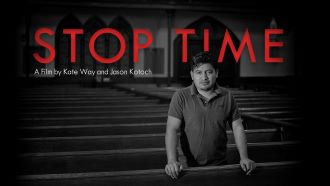
Stop Time 2022
Distributed by New Day Films, 350 North Water Street Unit 1-12, Newburgh, NY 12550; 888-367-9154
Produced by Kate Way and Jason Kotoch
Directed by Kate Way and Jason Kotoch
Streaming, 50 mins
High School - General Adult
Christianity; Human Rights; Immigration; Religion
Date Entered: 09/18/2023
Reviewed by Casey Mazzoli, Early Career Development Resident, Otterbein UniversityStop Time follows the story of Lucio Pérez, who received a deportation order in 2017. The film opens with accounts of Lucio’s and his wife’s profiling and arrest in 2009, their handing-over to immigration officials, the deportation order, a failed appeal for stay of removal, and the subsequent search for asylum for Lucio. This film does an excellent job showing viewers what immigration cases look like day-to-day— and year-to-year. It follows Lucio’s story through 2021, when he is granted a stay of removal while his case remains undecided, emphasizing how lengthy such processes are and how situations like Lucio’s may change depending on government administrations, but always remain precarious.
In addition, the core of the story involves Lucio’s sanctuary at the First Congregational Church of Amherst, MA beginning in 2017. This storyline highlights religious activism and the relationship between religious spaces and the law. To quote Glenn Formica, the Immigration Attorney for Lucio’s appeal to the Second Circuit, the only thing stopping ICE from picking Lucio up from the church to be deported is “their own conscience...and the political fallout they would suffer violating the church.”
While Reverend Vicki Kemper frames her church’s involvement as apolitical, the film reveals the ways religious action supports people whose lives are heavily impacted by political developments. The congregation’s involvement in Lucio’s sanctuary— including its collective decision-making regarding his asylum and how to accommodate him best— also demonstrate the high level of community support required for someone to fight a deportation case.
Stop Time also shows the overt legal and political support required to fight a deportation case. A filmed conversation with Glenn Formica offers insight into the web of risky decision-making Lucio and others like him must make in an effort to remain in the U.S. Diana Sierra Becerra from the Pioneer Valley Workers Center is shown participating in direct action and providing council for Lucio.
Stop Time does not cover immigration policy or the history and action of ICE in detail, but also does not claim to. Rather, it aims to show how these forces impact the lives of individuals, families, and communities. The people advocating for Lucio represent differing approaches, some attempting to work the legal game, some appealing with hope or concession to the government’s intentions, and some adamant that the way forward is resistance. Lucio and his family remain central, reminding the viewer that the stakes of all these forces, and the primary burdens of a case like this, rest on families like Lucio’s.
This film is recommended for high school and undergraduate students, as it would introduce students to personal experiences with immigration and to underpin a more explicit study of immigration legislation.
Awards:Official Selection, 2022 Immigration Film Fest; Official Selection 2023 Impact Doc Awards
Published and licensed under the Creative Commons Attribution 4.0 license. Anyone can use these reviews, so long as they comply with the terms of the license.